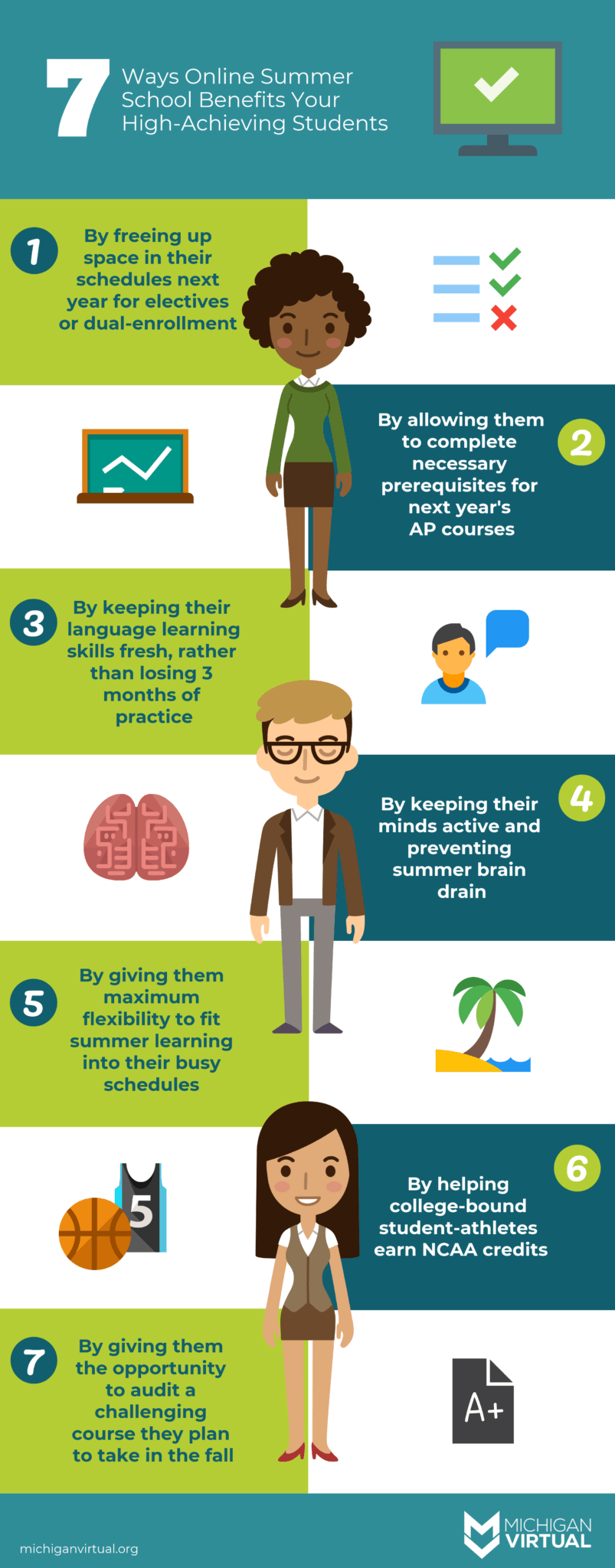It’s a frigid day in Lansing. The first blankets of snow have settled on the ground. The cold air sears your lungs with each inhalation. The colorless gray of the sky is relentless. It’s time for us to admit the inevitable truth:
It’s officially winter in Michigan.
Today might not seem like the best time to be talking to you about summer school, but give us just a few minutes to challenge this perception. Because — while it may seem counterintuitive — now is the time that school administrators need to start thinking about their summer learning programs.
Why start now?
The simple truth is: It takes time, energy, and resources to build an effective summer school program. If you want your students to succeed this summer, then you have to start laying the foundation for their success ASAP.
It might seem far away now, but you only have about six months to complete the following:
- Evaluate, design, and/or redesign your summer school program
- Find teachers who are able to serve as instructors or mentors over the summer
- Reserve classrooms and/or set aside the technology needed for students to work on their summer courses
- Communicate options to students and parents, and
- Enroll students in their courses
We know about the negative effects of summer brain drain.
We know that summer learning is important and that all students deserve opportunities to learn over the summer. But, from our experience, the students that most often take advantage of these opportunities fall into two groups:
- Students who are trying to get ahead on their coursework
- Students who are trying to recover credits needed for graduation
When designing your summer school program, we recommend that you consider the needs of your high-achieving students who are trying to leverage summer learning opportunities to get ahead. These students often know what they want and are willing to do what it takes to accomplish it.
Your questions should be: What do these students need to succeed? What is it that they’re looking for in a summer school program?
For self-motivated learners, taking online summer school courses can be liberating because it allows them to make progress toward their goals while studying at their own pace in time blocks that fit their busy schedules. In some cases, online programs offer students more learning options with more flexibility than their face-to-face counterparts.
Here are 7 ways online summer school benefits your high-achieving students:
#1 — By freeing up space in their schedules for next year’s electives and dual enrollment
High-achieving students are often busy students. Curious and driven to learn, they likely have more subjects they want to study than they have time available in their schedules. Unfortunately, unlike in the Harry Potter-verse, there are no magical “time turners” in our simple, Muggle world. Unlike Hermione Granger, students cannot be in two courses simultaneously, so they often run into scheduling conflicts that disrupt their best-laid plans.
If you have students who regularly run into this issue, then summer online learning may be a great option for them. This way, they can take Orchestra, Band, German, and dual enroll next semester, without having to worry about how to fit in their Algebra 2 requirement.
#2 — By allowing them to complete necessary prerequisites for next year’s AP courses
One of the biggest problems for high-achieving students is trying to find ways to get the most bang for their buck during their high school years. Let’s face it: Getting a college education is an expensive endeavor. If a student wants to gain college credits while still in high school, they’ll need to plan strategically. Online summer learning is one way they can optimize their schedules, so they are able to enroll in AP courses at the start of next year’s Fall semester.
#3 — By keeping their language learning skills fresh, so they don’t lose 3 months of practice
Gaining fluency in another language requires dedication, practice, and consistency. For this reason, taking three months off during the summer can cause attrition of fluency and have a negative impact on student proficiency. One way for students to keep their language skills sharp during the summer is by taking online world language courses, where they can work alongside an expert instructor and practice their skills by conversing with other budding language learners around the state.
#4 — By keeping their minds active and preventing summer brain drain
On average, it is predicted that students lose about one month’s worth of learning over the summer. In math and reading, these predictions are even more drastic, with an estimated two months of learning loss in some studies. In addition to helping students get ahead and meet their scheduling needs, enrolling in online summer courses can help them keep their minds active, so as to mitigate the effects of the dreaded summer brain drain. Not only will they learn new content over the summer, but they may also come back to school having forgotten less of last year’s content than their peers.
#5 — By giving them maximum flexibility to fit summer learning into their busy schedules
It’s hard to blame students for not wanting to give up their precious summer break, or skip out on their family vacation, to participate in summer school after working so hard during the previous school year. One of the benefits of online summer learning is that it’s a more flexible alternative than most face-to-face programs. Students have more course offerings from which to choose, as well as more time to complete their assignments. For self-motivated students, who thrive when given autonomy and control over their learning, online courses can provide a summer learning option that fits into their professional or personal schedules.
#6 — By helping college-bound student-athletes earn NCAA credits
When evaluating summer learning options for student-athletes, one factor worth considering is whether or not their summer learning options are NCAA-accredited. The goal with these requirements is to ensure that athletes are well-prepared for the rigor of college academic study. Online courses that are NCAA-accredited can help student-athletes get ahead on these requirements over the summer, so they have more flexibility for balancing sports and school in the upcoming year.
#7 — By giving them the opportunity to audit a challenging course they plan to take in the fall
Another reason students enroll in online summer courses is not to earn credit, but to audit a challenging course they may take in the fall. By taking this course over the summer, they can familiarize themselves with course content and begin the process of concept mastery, so the course is more manageable when they take it in-person during the following school year. This is a less common motivation, but we have witnessed it rising in popularity during recent years. We only recommend this course of action to students who are serious about auditing and are willing to complete the work, even if it means not earning credits.
The caveat: Not all online courses are created equal.
We hope you find this list helpful as you consider which types of students might benefit from summer learning programs this summer and what type of learning options you might offer them. We believe that self-motivated, high-achieving students can benefit from the flexibility and autonomy offered by online summer courses.
That being said, we also find it important to clarify that not all online courses are created equal. Online learners need to be supported in order to succeed. That’s why we work so hard to hire only highly qualified, Michigan-certified instructors to teach our online courses. That’s why we encourage schools who partner with us during the summer to open up lab space for students to work if they need additional support from a trained mentor. That’s why we offer the same quality content in our 10-week abbreviated summer courses as we do during our 18-week, full-semester courses.
The moral of the story
Before you select an online learning provider, make sure your students are getting a high-quality and supportive learning experience. Your high-achieving students will thank you for it later.


